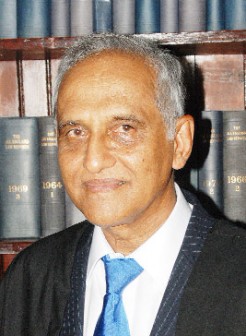Acting Chief Justice Ian Chang yesterday dismissed a 12-year-old action brought by Cara Investments Limited against Chartered Accountant Christopher Ram and the Bank of Nova Scotia over the sale of Hotel Tower.
In a written decision, in which he also awarded $75,000 costs to both Ram and the bank, Justice Chang also found that Ram’s inclusion in the action for damages for breach of contract, on the basis of him being appointed by the bank as receiver of Hotel Tower to be “wholly misconceived.”

“The court is unable to discern or imply from the evidence any misrepresentation on the part of the Receiver (Mr. Ram) that he would have at least considered the tenders fairly before rejecting them-in the light of the wide power of rejection contained in the Cancellation Clause of the RFP [Request for Proposal],” Justice Chang said in his ruling.
In January 2000, Cara moved to the High Court seeking, among other things, a declaration that Ram was in breach of his RFP for the Hotel Tower Limited and a declaration that the he acted unfairly to the company and in breach of the legal requirements in the matter. Cara also sought an injunction restraining Ram from awarding or allocating the purchase of Hotel Tower until an inquiry was conducted at the instance of the court as to the propriety and conformity with law of the bidding and selection process.
Cara was represented by Sanjeev Datadin, while Ram was represented by Senior Counsel Edward Luckhoo. Senior Counsel Rex Mc Kay along with Senior Counsel Richard Fields and attorney Bettina Glasford appeared for Scotia Bank.
Ram, in an initial reaction to the ruling yesterday, said to have the matter dismissed is a “kind of relief” even though he did not expect a different outcome, since it was an “absolutely baseless piece of action by Cara and their attorney.” “I thought the court, the Chief Justice did a great job, the court was very patient in allowing arguments of little substance,” he said. “It is always good to be exonerated and vindicated, especially with the campaign waged against me by the Guyana Chronicle and its sister newspaper the Guyana Times,” Ram said.
In giving a background to the case, Justice Chang noted that on April 9, 1999, the bank appointed Ram as Receiver/Manager of Hotel Tower and he assumed duties under the said appointment on the same date. Later, in his capacity as Receiver, Ram advertised in the Stabroek News the RFP for the purchase of the assets of the hotel. In those advertisements, he expressly reserved the right “to terminate the process at any time before any definite agreements are executed.”
On December 23, 1999, Cara, in response to the said advertisements, submitted a proposal document which was described as to “represent our expression of interest.” Cara later applied for and was granted an extension up to January 12, 2000 to submit its proposal. But no new date was fixed by Ram for the opening of the tenders and on January 25, the same year Cara filed their proceedings against the defendants.
On April 27, 2001, Cara’s application was granted for the bank to be joined as an added defendant. In response to the request for the injunction, Ram, through his counsel, gave an undertaking to the court not to proceed further with the process until the determination of the action. Since then, Ram took no further steps in furtherance of the tender process. Justice Chang said that undertaking was still in operation up to the time that his receivership came to an end, in 2003, following the sale of the shares in the hotel by its shareholders to investor R L Singh Investors Group. “It is significant to note that in paragraph 10 of the Statement of Claim, Cara asserted, quite correctly as a matter of law that Mr. Ram, in conducting the tender process, acted as agent of the bank. Indeed, every act of Mr. Ram in the conduct of the tender process was done as agent of the bank,” Justice Chang said in his ruling yesterday.
Therefore, Ram as agent could not be liable in contract for those acts, he added. “The action against Mr. Ram for damages for breach of contract is wholly misconceived. Moreover, the evidence does not reveal that Mr. Ram made any misrepresentation to anyone giving rise to a claim for damages for misrepresentation whether in contract or in tort,” he ruled.
Justice Chang said he was unable to discern or imply from the evidence any misrepresentation on the part of the Ram that he would have at least considered the tenders fairly before rejecting them, in the light of the wide power of rejection contained in the Cancellation Clause of the RFP.




